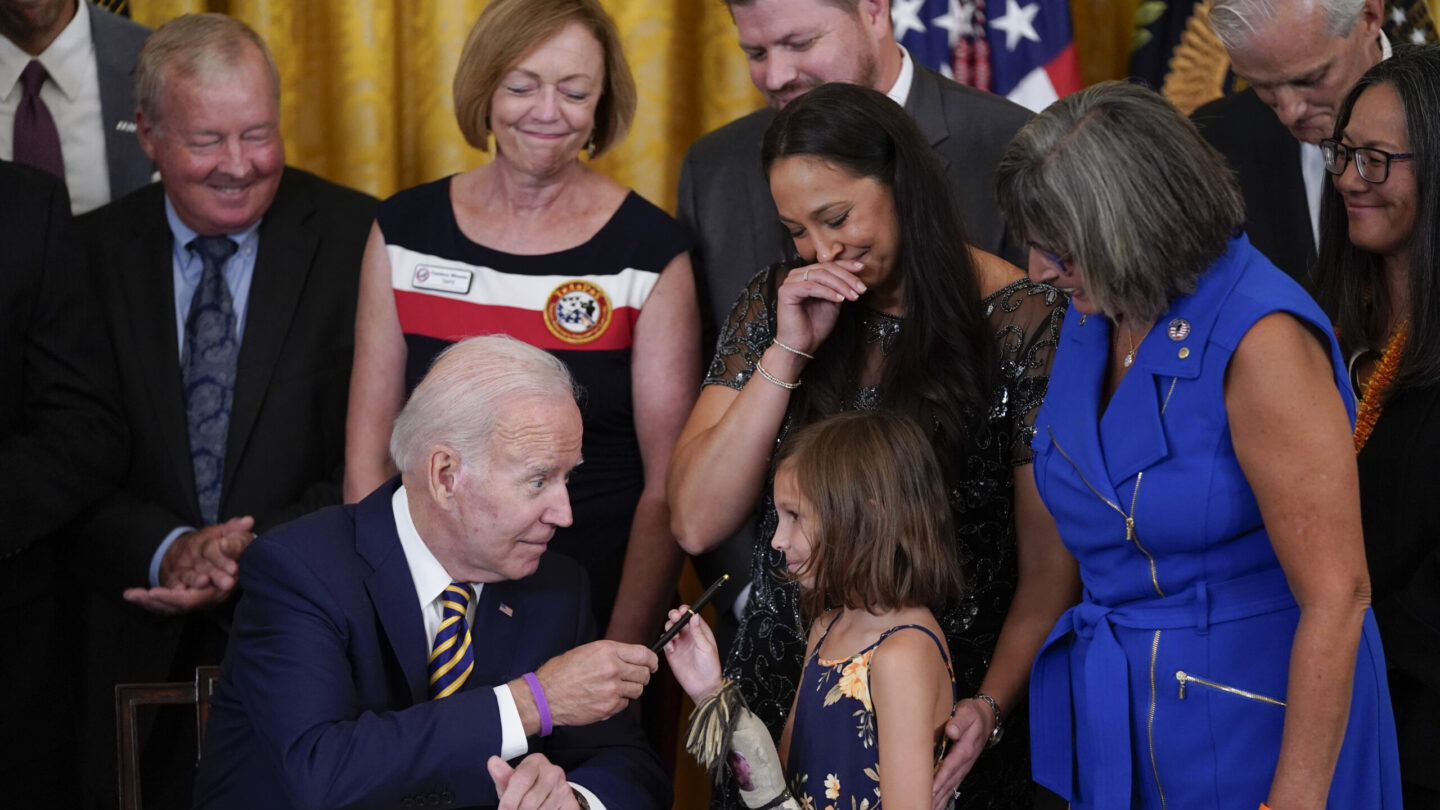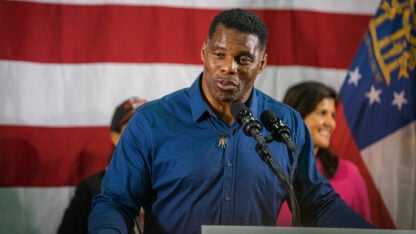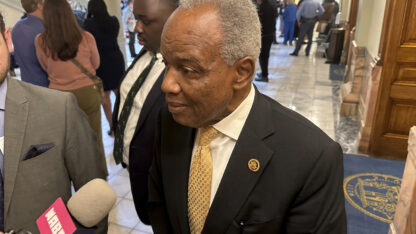President Joe Biden and his allies hope big recent wins on climate, health care and more will at least temporarily tamp down questions among top Democrats about whether he will run for reelection.
That optimism may be short lived, at risk if and when former President Donald Trump announces another White House campaign. But for now, the “Will he or won’t he” Washington parlor game appears to be on hold.
“I think the naysayers are pretty quiet right now,” said former Democratic Virginia Gov. Terry McAuliffe. “I think they’ve seen reality.”
In just the past several weeks, Biden has signed into law a climate and prescription-drug package that accomplishes many of his party’s long-held objectives; Congress has sent him bills that impose strict limits on guns and set out a plan to boost U.S. high-tech manufacturing. A drone strike killed al-Qaida leader Ayman al-Zawahri, average gasoline prices have fallen back below $4 per gallon and there are signs that inflation — while still white-hot — may finally be cooling.
All that has eased a debate over Biden’s future that was spreading. Fellow Democrats running for reelection were struggling to answer whether America’s oldest president should seek another term. But now they have a fresh agenda they can campaign on heading into the November midterms.
The president has increased his Democratic fundraising efforts, and next week in Maryland he’s holding his first rally for the party of the fall campaign season. He also plans to travel aggressively to boost candidates.
As a former senator, Biden knows some lawmakers may need to create distance from him to best win their races — but also that others could benefit from joint appearances. Aides say Biden may prove most useful amplifying Democrat-championed issues that are broadly popular, like lowering prescription drug costs and protecting abortion rights.
Cedric Richmond, one of Biden’s closest White House advisers before leaving for a senior Democratic National Committee job, said he wasn’t sure the spate of positive news would put an end to 2024 questions, “but it should.”
For “tried and true Democrats, the answer was a simple, ‘Yes, he should run. Yes he’ll be our nominee. Yes he’ll win.’”
But comments like that don’t make the news, said Richmond, a former Louisiana congressman. “So the only story was when somebody waffles or blows the question.”
Those have included New York Democratic Reps. Carolyn Maloney and Jerry Nadler both declining during a recent primary debate to say if Biden should seek a second term. In a subsequent statement, Maloney said she’d support Biden “if he decides to run,” then drew still more scrutiny while appearing on CNN by imploring Biden: “I want you to run. I happen to think you won’t be running.”
Not all lingering doubt can be attributed to awkward answers, though.
Swing-district Minnesota Democratic Rep. Dean Phillips said he didn’t want Biden to run in 2024. West Virginia Democratic Sen. Joe Manchin, whose about-face revived the climate and prescription drug legislation, has refused to say if he’d support a second Biden term. Stars of the progressive left, like New York Rep. Alexandria Ocasio Cortez, have similarly been noncommittal.
But Biden hasn’t been abandoned. Prominent Democrats, including New York Rep. Hakeem Jeffries, chair of the House Democratic Caucus, openly praise him during campaign appearances. In an interview, Jeffries ticked off the president’s recent wins and included administration successes going back to last year’s infrastructure spending and stimulus spending packages, as well as ongoing COVID-19 vaccination efforts.
“If someone were to say that a president had a record of accomplishment that I just described, without putting a time frame on it, the logical response would be: That person had a successful two-term presidency,” Jeffries said.
Still, other Democrats say a few positive headlines won’t be enough.
“Biden will have good and bad weeks in the news, but the fundamentals remain adverse,” said Norman Solomon, national director of RootsAction.org. His progressive activist organization, already frequently critical of the president, has launched a “Don’t Run Joe” effort.
Solomon wants Biden to announce he’s not running, freeing him to take bigger political risks and achieve a more successful one-term presidency. He suggested that White House advisers who worry about making Biden a lame duck are engaging in a “significant degree of whistling past the political graveyard.”
White House allies stress that the 2024 decision will ultimately be Biden’s alone. He’s on track to follow a similar timeline to former President Barack Obama, who declared for 2012 reelection in April 2011, aides say.
No modern incumbent president has faced such hesitation within his own party, nor been realistically threatened in a primary. Intra-party challengers, if they emerge, could weaken both the president and his party.
Some Biden observers see the president, who came out of political retirement because he believed himself best able to take on Trump in 2020, as less likely to seek reelection if his predecessor ultimately opts not to run.
If Biden runs, he’ll have to level with voters about his age — convincing them he’s really up for a second term that wouldn’t end until he’d be 86. Still, Richmond said such discussions could actually help Biden.
“I’m not going to let people, all of a sudden, say wisdom and experience is a bad thing,” he said. “The president of the United States, leader of the free world, that’s exactly what you want.”
While Biden’s age is unprecedented — so, too, would Trump’s at 82 — there’s almost as little tradition of presidents not seeking reelection after just four years in office. The last one was Rutherford B. Hayes in 1880.
Texas Democratic state Rep. Jasmine Crockett, a civil rights attorney expected to win an open House seat in Dallas, said if Biden “decides he wants to run, we’ve got to unite behind that.” But she also said the president hasn’t fought to preserve voting rights aggressively enough.
“From a public standpoint, especially when it comes to Black folks, it was not taken too kindly that they did not see or hear more coming from the president,” Crockett said. “If Black people come out and vote, Democrats win. If Black people stay at home, Democrats lose.”
Biden insisted last month that Democrats “want me to run.” But a Quinnipiac University poll in July found that only 24% of Americans overall, and 40% of Democrats, said that. The president’s approval rating has dropped below 40% for two straight months.
For positive reinforcement, Biden could look to a president at the opposite end of the political spectrum: Ronald Reagan, who took office in 1981 at age 69, making him the country’s then-oldest president.
With inflation spiking by the fall of his second year, a Washington Post-ABC News poll found that 6 in 10 Americans said Reagan shouldn’t run again, and his approval ratings sank to 35% by the following January. The next year, Reagan romped to reelection, winning every state but Minnesota and the District of Columbia.
McAuliffe, who was beaten in his bid to reclaim the governorship last November by Republican Glenn Youngkin despite Biden having carried Virginia by 10 points the previous year, said the president and Democrats have already seized momentum and “age doesn’t matter.”
“He’s at the top of his game. And this party, which a year ago was in disarray, and different elements of our party fighting one another,” McAuliffe said. “Now you’ve got a party that is united, fired up and legislative accomplishments that every American has wanted for many years.”









